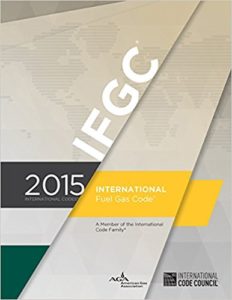International Fuel Gas Code 2015 1st Edition
International Fuel Gas Code 2015 1st Edition
The International Fuel Gas Code is kept up to date through the review of proposed changes submitted by code enforcing officials, industry representatives, design professionals and other interested parties. Proposed changes are carefully considered through an open code development process in which all interested and affected parties may participate.
The contents of this work are subject to change through both the Code Development Cycles and the governmental body that enacts the code into law. For more information regarding the code development process, contact the Codes and Standards Development Department of the International Code Council.
While the development procedure of the International Fuel Gas Code ensures the highest degree of care, the ICC, its members and those participating in the development of this code do not accept any liability resulting from compliance or noncompliance with the provisions because the ICC does not have the power or authority to police or enforce compliance with the contents of this code. Only the governmental body that enacts the code into law has such authority.
2015 Product details
- Series: International Fuel Gas Code
![International Fuel Gas Code]()
- Paperback: 176 pages
- Publisher: ICC (distributed by Cengage Learning); 1 edition (June 5, 2014)
- Language: English
- ISBN-10: 1609834771
- ISBN-13: 978-1609834777
- Product Dimensions: 8.5 x 0.5 x 11.2 inches
- Shipping Weight: 1.2 pounds
You can Read International Energy Conservation Code 2015 1st Edition
The IFGC is a model code that regulates the design and installation of fuel gas distribution piping and systems, appliances, appliance venting systems, combustion air provisions, gaseous hydrogen systems and motor vehicle gaseous-fuel-dispensing stations. The definition of fuel gas includes natural, liquefied petroleum and manufactured gases and mixtures of these gases.
The purpose of the code is to establish the minimum acceptable level of safety and to protect life and property from the potential dangers associated with the storage, distribution and usage of fuel gases and the byproducts of combustion of such fuels. The code also protects the personnel that install, maintain, service and replace the systems and appliances addressed by this code.


Comments are closed.